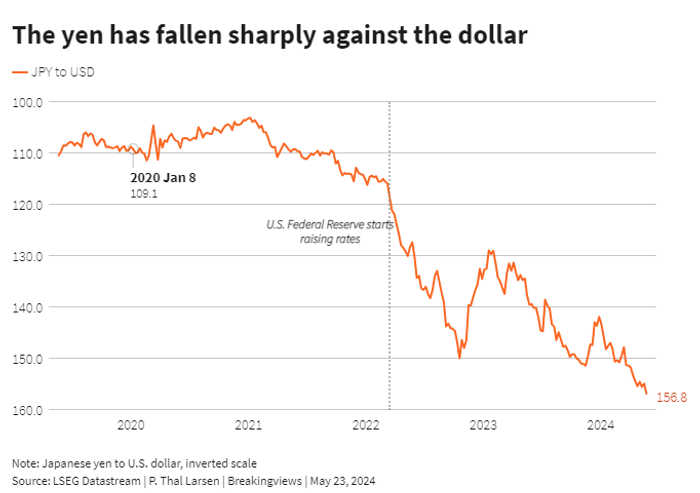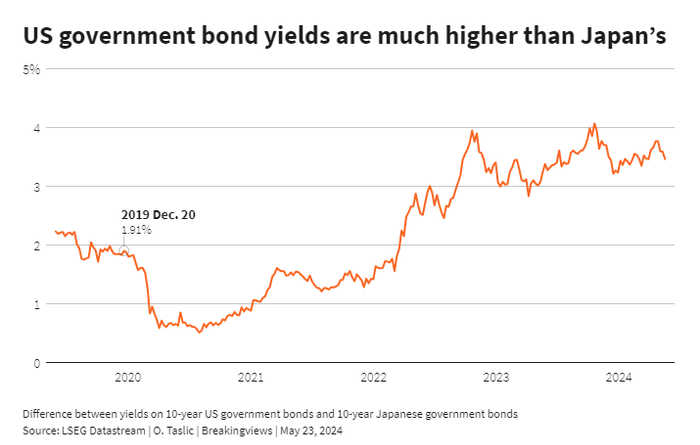Published 15:45 IST, May 24th 2024
Japan’s new widowmaker trade may have shorter life
When market exchange rates diverge dramatically from this measure economic forces help to rectify the imbalance.
- Markets
- 5 min read

Widow’s peak. For more than two decades, investors lost their shirts in Japan. In a trade that became known as a “widowmaker”, they sold short Japanese government bonds with their tiny yields, yet suffered as long-term rates crept ever lower and bond prices rose. Today, taking a long position in Japan’s currency is similarly threatening to shorten the lifespans of investors in the Land of the Rising Sun. Over the past three years, the yen has fallen by around 50% against the U.S. dollar. But there are good reasons that painful bet may pay off sooner.
The erection of a giant barrier in Yamanashi prefecture provides a glimmer of hope for yen bulls. The mesh net going up above a convenience store in the resort of Fujikawaguchiko will block a scenic view of Mount Fuji. Hordes of noisome tourists have been gathering at this spot to take holiday snaps, leaving behind litter and ignoring traffic regulations, a town official told Agence France-Presse.
Large numbers of tourists are arriving in Japan because the currency is dirt cheap. According to the Economist’s Big Mac Index, one of McDonald’s flagship burgers in January cost 47% less in Japan than in the United States. The OECD estimates the yen’s fair value at 95 to the dollar, compared to its current market price of 156.

The OECD’s calculation is based on purchasing power parity, which assumes that over time the price of Big Macs and other products in two countries, as measured in their respective currencies, should converge. The economist John Maynard Keynes described purchasing power parity as “the point about which the exchanges fluctuate, and at which they must ultimately come to rest.”
When market exchange rates diverge dramatically from this measure economic forces help to rectify the imbalance. That’s why foreign tourists are flocking to Japan. Japanese exports in April were up 8.3% on the previous year, according to Reuters. The country’s current account surplus has also rebounded.
Keynes observed that currencies can diverge from purchasing power parity when speculators expect one country to experience higher inflation than another. That is what occurred in the early 1920s, when hyperinflation took off in Germany and elsewhere in Europe. Some commentators believe that Japan’s vast mountain of public debt – the highest in the developed world at almost 260% of GDP – will force the Bank of Japan to keep interest rates too low for too long. As a result, they anticipate that Japan will suffer from high inflation at some stage.
Such a scenario would not bode well for the yen. Most investors, however, aren’t reckoning on this outcome. Inflation in Japan at 2.7% is below the U.S. level. Expectations for inflation in Japan over the medium term, as reflected by the difference in yields between nominal and inflation-protected bonds, is slightly below the BOJ’s 2% target, according to a recent note by economists at the San Francisco Federal Reserve. Surveys of inflation forecasts tell a similar story.
Still, given the country’s large public debt, it’s possible that the central bank will seek to keep interest rates below inflation for a prolonged period. As the investment strategist Russell Napier puts it: under free-market conditions so-called financial repression is normally negative for a currency.
In Japan, however, a free market may not be allowed to operate. Napier foresees a day when the BOJ forces Japanese financial institutions to repatriate a chunk of their vast overseas assets and increase their holdings of domestic government bonds in order to keep interest rates down. In that scenario, the yen would mostly likely rise. After the devastating earthquake and tsunami of 2011, Japanese investors repatriated their savings on a large scale and the yen climbed sharply against the dollar.
There’s a more prosaic explanation for the yen’s recent decline which has nothing to do with sovereign debt and inflation. Over the past few years a large gap has opened up between short-term interest rates in the United States and Japan. The Fed Funds Rate stands at 5.5% while the Bank of Japan’s policy rate is a measly 0.1%. Japanese retail investors have sold yen and bought dollars to pick up the extra yield. At the same time, they have enjoyed large capital gains – in yen terms – as the currency weakened. Trend-following hedge funds, known as commodity trading advisors, have also jumped on the short yen trade, encouraged by the recent low volatility of the dollar-yen exchange rate.

This trade appears to be running out of juice. Earlier this year, the BOJ appeared insouciant about the yen’s weakness. As the currency approached 160 against the dollar in late April, however, BOJ Governor Kazuo Ueda changed his tone while Japanese authorities unofficially intervened to support the currency. Morgan Stanley economists expect the central bank will hike rates at its next meeting in July and cut back on its ongoing purchases of securities.
The actions of the Federal Reserve could have an even greater impact on Japan’s currency. U.S. interest rates are no longer rising across the curve. Yields on long-dated U.S. and Japanese bonds have moved closer together in recent months. This week Federal Reserve Governor Christopher Waller said that nascent signs of a slowdown in inflation and growth in the United States meant that the Fed could “probably” rule out further interest rate rises.
Since the widening gap between short-term rates in Japan and the United States appears responsible for the yen’s collapse, the Japanese currency should perform well when the interest-rate differential between these countries narrows. The yen also provides foreign investors with a hedge against unexpected financial turbulence. During the global financial crisis of 2008, the Japanese currency soared after speculators who had borrowed yen to acquire higher-yielding currencies were forced to change course. Since the short-yen trade is thriving once again, history could repeat itself when the next major financial upset occurs.
Updated 17:21 IST, May 24th 2024